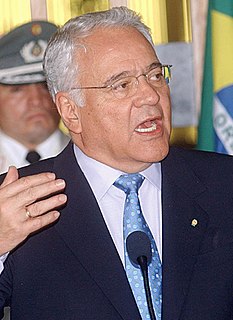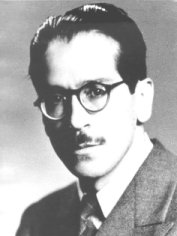
The Christian Democratic Party is a progressive Christian-democratic political party in Bolivia.

The Revolutionary Party of the Nationalist Left was a left-wing political party in Bolivia. It was founded in 1963 by the labor leader Juan Lechín Oquendo and by Mario Torres Calleja and Edwin Moller in lesser roles. The PRIN seceded from the Revolutionary Nationalist Movement (MNR) in protest against Víctor Paz Estenssoro's decision to seek a third elected term as president in 1964, rather than permit then Vice-President Juan Lechín to have the MNR's presidential nomination.

The Bolivian Socialist Falange is a Bolivian political party established in 1937. Despite its leftist-sounding name, it was a far-right party drawing inspiration from fascism. It was the country's second-largest party between approximately 1954 and 1974. After that, its followers have tended to gravitate toward the government endorsed military candidacy of General Juan Pereda (1978) and, especially, toward the ADN party of former dictator Hugo Banzer. Its current status is unclear.

General elections were held in Bolivia on 30 June 2002. As no candidate for the presidency received over 50% of the vote, the National Congress was required to elect a President. Gonzalo Sánchez de Lozada was elected with 84 votes to the 43 received by Evo Morales.

General elections were held in Bolivia on 7 May 1989. As no candidate for the presidency received over 50% of the vote, the National Congress was required to elect a President on 6 August. Although the Revolutionary Nationalist Movement had received the most votes, its candidate for President Gonzalo Sánchez de Lozada was defeated by Jaime Paz Zamora of the Revolutionary Left Movement (MIR) in the Congressional vote, despite the MIR only finishing third in the public vote.

General elections were held in Bolivia on 6 June 1993. As no candidate for the presidency received over 50% of the vote, the National Congress was required to elect a President on 4 August. Gonzalo Sánchez de Lozada of the Revolutionary Nationalist Movement–Revolutionary Liberation Movement Tupaq Katari alliance was subsequently elected unopposed.

General elections were held in Bolivia on 1 July 1979. As no candidate in the presidential elections received a majority of the vote, the National Congress was required to elect a President. However, the Congress failed to elect a candidate after three ballots, and instead selected Senate leader Wálter Guevara to serve as Interim President for a year on 8 August. Guevara was later overthrown by a military coup led by Alberto Natusch on 31 October. Fresh elections were held in June 1980.

General elections were held in Bolivia on 31 May 1964. Víctor Paz Estenssoro of the Revolutionary Nationalist Movement (MNR) was the only candidate for president, and was re-elected with 98% of the vote. The MNR retained its large majority in Congress.

Parliamentary elections were held in Bolivia on 4 June 1962. The Revolutionary Nationalist Movement (MNR) received 85% of the vote, and retained its large majority in both houses of Congress.

General elections were held in Bolivia on 5 June 1960. Víctor Paz Estenssoro of the Revolutionary Nationalist Movement (MNR) was elected President with 76% of the vote, whilst the MNR retained its large majority in Congress.

Parliamentary elections were held in Bolivia on 20 June 1958. The Revolutionary Nationalist Movement (MNR) received 85% of the vote, and retained its large majorities in both houses of Congress.
The Authentic Revolutionary Party was a political party in Bolivia.
The Nationalist Union of the People was a right-wing, pro-military electoral political alliance in Bolivia.
The Movement of the National Left was a left-wing political party in Bolivia.
The Democratic Alliance of National Revolution was a centrist electoral political alliance in Bolivia.
The Revolutionary Nationalist Movement–Alliance was a centrist electoral political alliance in Bolivia.
The Alliance of Nationalist Left Forces of the MNR was a leftist political party in Bolivia.
The Revolutionary Nationalist Movement–Julio was a pro-military political party in Bolivia.
The Bolivian National Congress 1979–1980 was elected on 1 July 1979.









